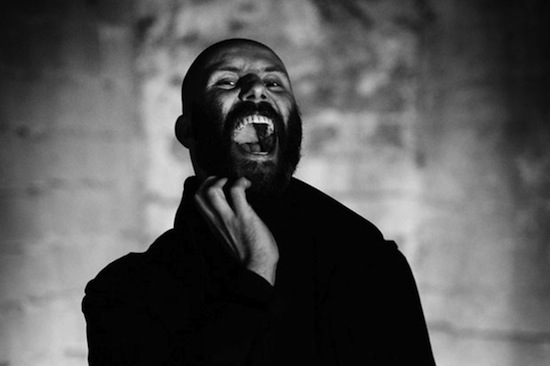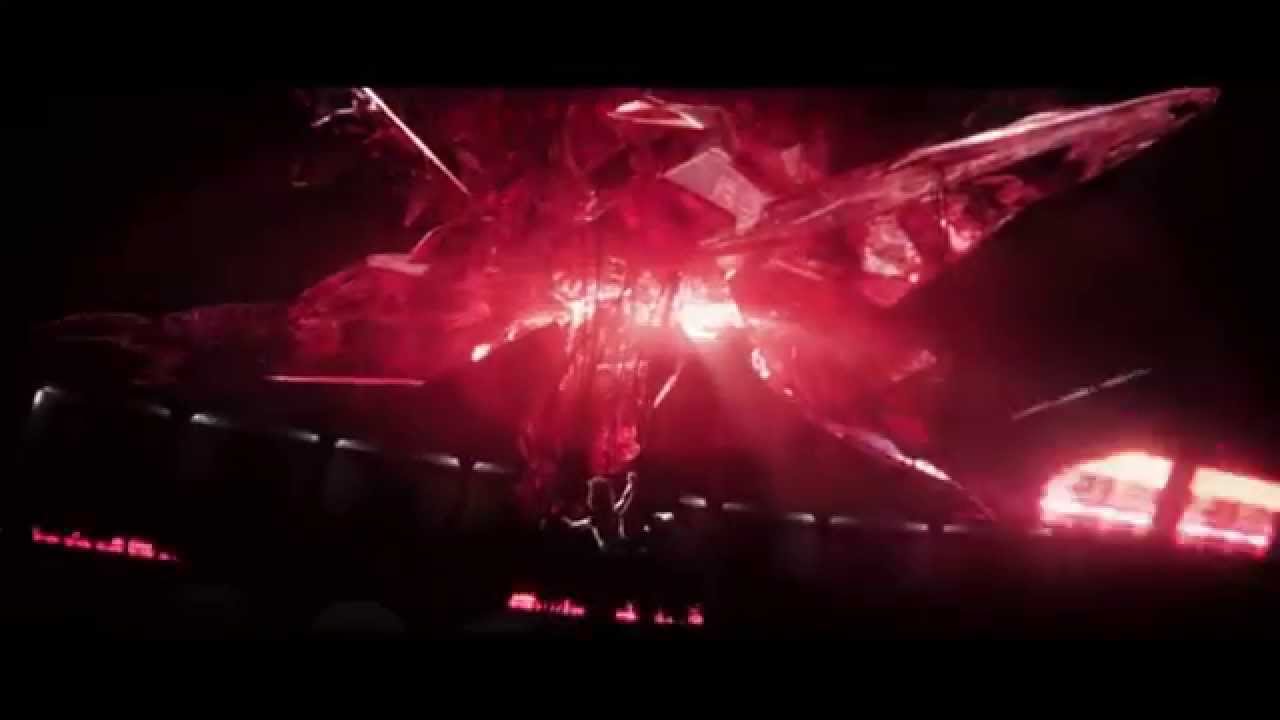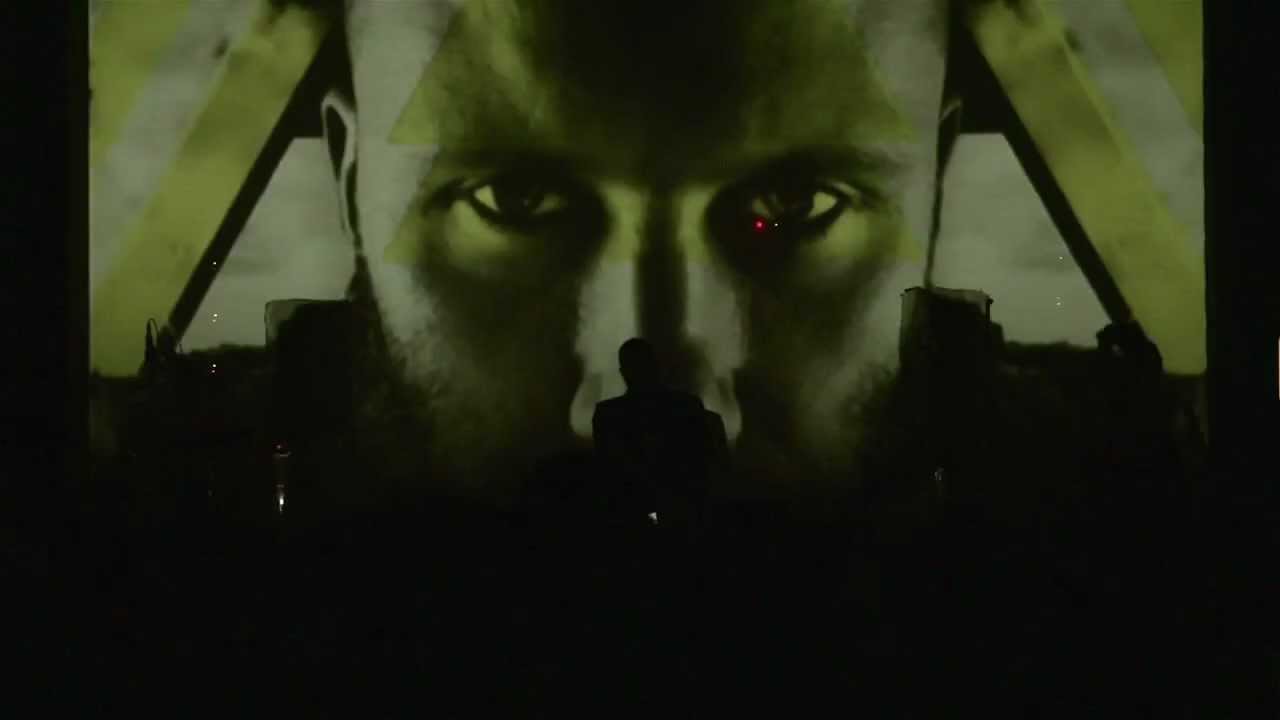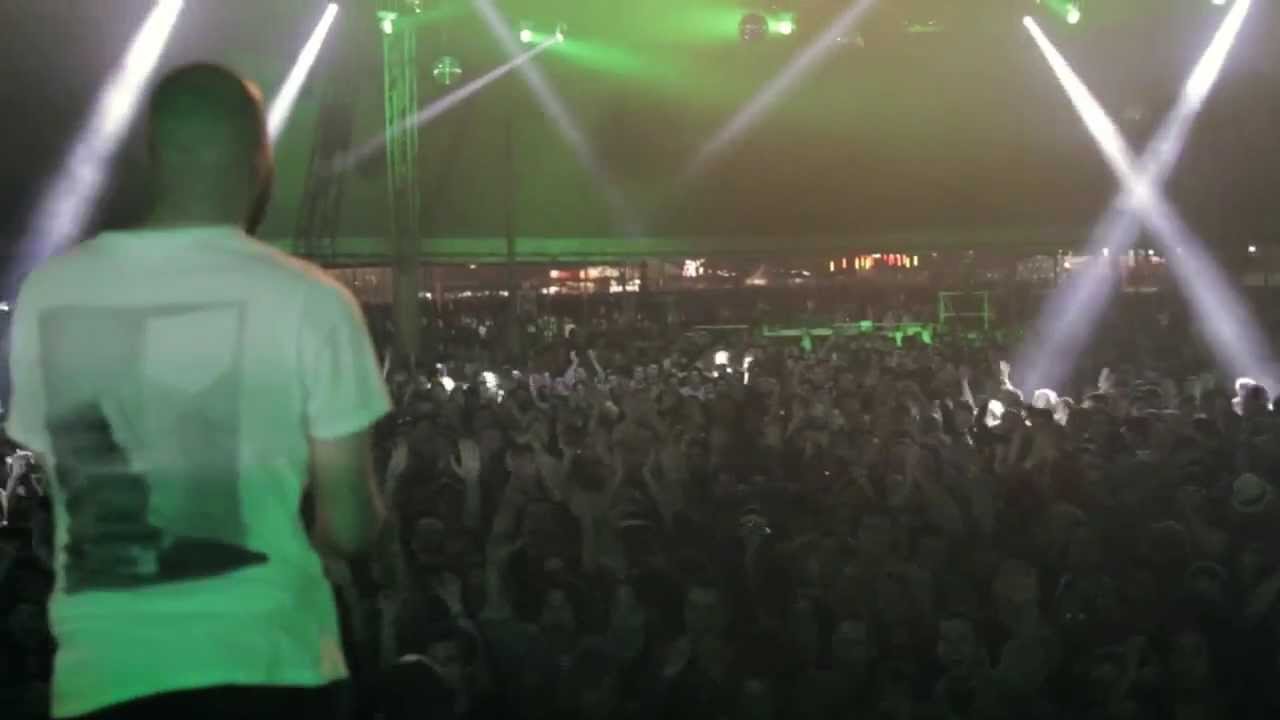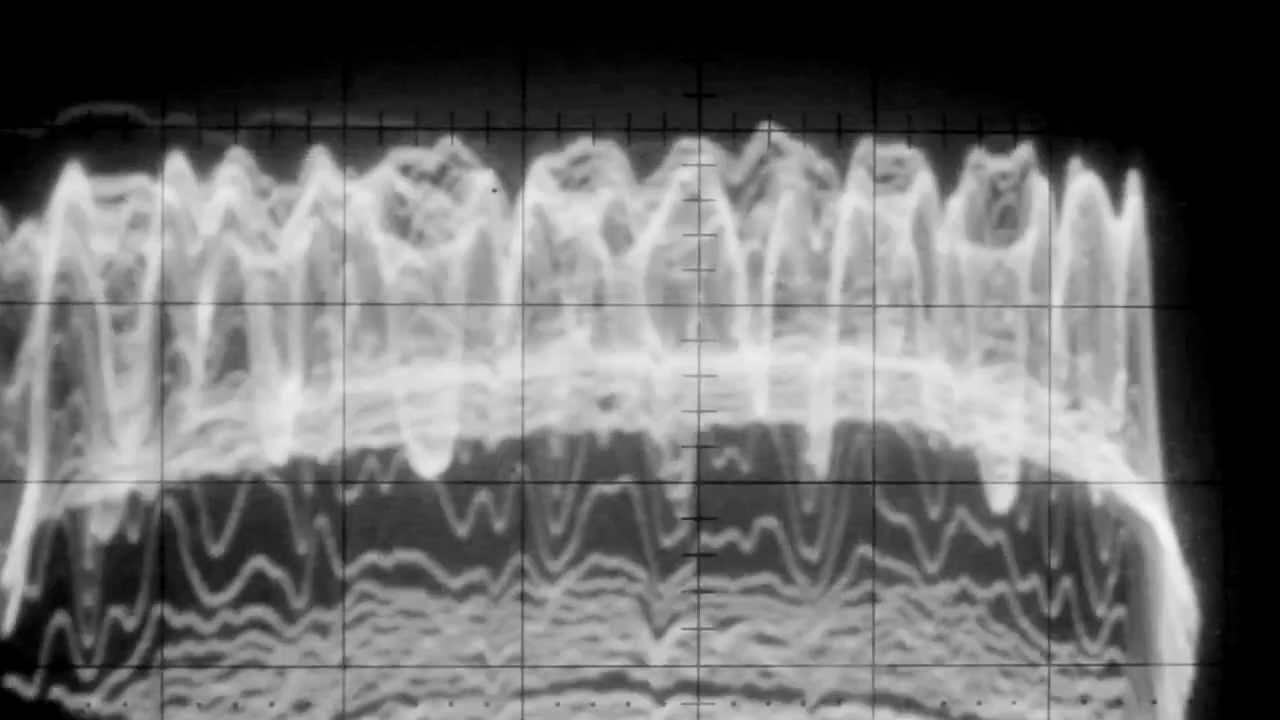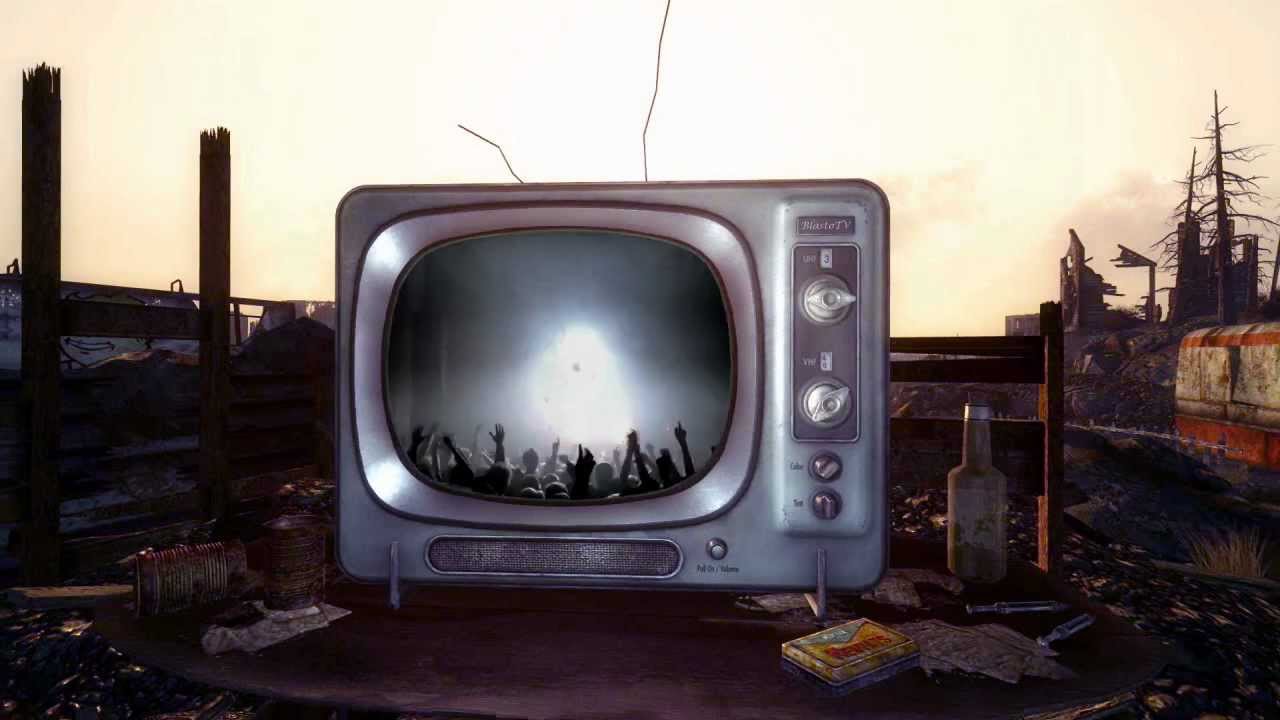Photograph courtesy of Vilhelm Sjostrom
It’s the early hours in early May and I’m ensconced in downtown Helsinki’s 700-capacity Tavastia club awaiting a blitz to the senses. The disco is filling up with teens and early 20s sucked in from the cold Fennoscandian city night, and inside it’s all very civilised at first, but for a few pre-loaded Norsemen who’ve peaked too early. The support act are meek, like paschal lambs awaiting an ungodly slitting from ear to ear. Patrons appear aloof to what’s going on on stage, and they regard their watches and devices curiously and with the hope of accelerating time. Soon the support will be batted aside and the memory of contrasts will make it seem all the more cruel that history will record that both acts once stood on the same stage on the same night.
Aku Raski – aka Huoratron – is backstage at the official launch party for his unconscionably brutal Acid Reign EP, here tonight in his hometown, and he’s gearing up in whatever way he sees fit; he will soon limber up and blow us all away. A wolf in wolf’s clothing, he spends his time leaping up and down on his mixing desk and beating himself around the head when he’s in the throes of a live performance, so perhaps he does more of the same as prep.
After the first band slip away, DJ Kristiina Männikkö brings forth the dark hop as warm-up artist on decks, and then a hardcore of three hundred push their way to the front and a docile crowd becomes an ugly one. And they’re chanting, "HU-OR-TRON! HU-OR-TRON! HU-OR-TRON!" along to the THUD THUD THUD of the bass speakers. Then finally the moment is upon us, and what a moment. The cry of a sonic elephant trumpets from behind the velvet drape, and as the curtain falls the crowd are part pumping and part genuflecting in their unworthiness.
‘DDoS’ from the new record mashes its way out of the speakers before everything arrests, and then comes the most incredible riser you’ve heard in your life, bishing us in the face like Satan’s engorged phallus. And then the machinery starts again, and the strobes go off, and the euphoria takes hold as we dance in the blinding white light. ‘Acid Reign’ – with it’s sound of advancing armies, machine guns and military helicopters, smokes everything away…
Earlier in the day I arrive at Helsinki Airport, and while it’s spring across much of Europe, in Finland it still feels like Jack Frost is reluctant to put his icy fingers away for another season. I take the bus into the city centre, and only a loon on a motorbike with Viking horns jutting out of his helmet riding adjacent to the bus alerts me to the fact I’m in a Nordic country. Helsinki itself is certainly a peculiar sight in the context of Europe. Many of its neo-renaissance and opulent baroque edifices looming over you with their onion domes in the old town, were constructed during the 19th century when the country was still a Grand Duchy of the Russian Empire (it gained independence after the Russian revolution in 1917). The city is nearer to St Petersburg than it is to Stockholm and across the Gulf of Finland is Tallinn, with which it may one day share an underground tunnel. The bond Finns share with Estonians is significant, as both their countries are eurozone member states (Finland a founder member, Estonia latterly in 2011).
It’s complicated, but if Finland is a Scandinavian country then it’s not as Scandinavian as its neighbours. It has adopted the single currency when everyone else insisted on continuing with their own versions of the krona. Despite being a far-flung frontier for European unification it has always maintained close ties with Russia – and continues to do so – and it was this sound relationship with all of its neighbours that built the country’s prosperity under Urho Kekkonen, prime minister and later president, for three stretches dating back to 1950 (the longest of which lasted from 1956 until 1982, a preposterous amount of time for any visible, elected official).
Over the centuries Finland has been a part of the Swedish kingdom, a Duchy of Tsarist Russia, an autonomous eastern European state, an independent northern European state and now a western European outpost, and while it geographically shapeshifts, Finns are still said to maintain a strong sense of national identity even when conjoined to other empires, and even then they might seem like a bit of an anomaly to the rest of us. "Inclusive but also very independent" are certainly five words you might use to describe Raski, and as an artist, "anomaly" could be another apt description. His answers too are often diplomatic. He gives so much, and then you have to fill the details in for yourself.
On heading out of the airport, I notice a sign for a ‘Technopolis’, which feels appropriate given that I’m in town to interview a man who to me looks and sounds like the future of techno, and yet Helsinki is not a traditional city of techno. A cursory search on the internet for Finnish facts reveals there are more heavy metal bands, by ratio, per capita, or whatever other way you choose to measure it, than in any other part of the world. Techno culture is still fairly niche, though Huoratron is making such a name for himself that that could all soon change, and the mêlée in the Tavastia club suggests sooner rather than later.
Raski arrives at my hotel and hovers in the foyer. He towers above the clientele with all their suitcases, like one of those great buildings in the centre of town. We exchange pleasantries, and soon I’m aware – as is often the case – that the terrifying madman you see in the publicity photos is a warm and funny person. He’s a foreboding presence before he opens his mouth, but that soon dissipates once you get talking to him. His beard is trimmed neatly this evening, and with his shorn head and 18-hole boots there’s something about him that unmistakably reminds you of Richard, Paddy Considine’s avenging angel in Shane Meadow’s inspired East Midlands revenge tragedy, Dead Man’s Shoes. We wander to a nearby cafe and he insists on buying sparkling mineral water and my feta bruschetta (he says he doesn’t eat before a show). Raski looks relaxed when he’s not on the phone trying to sort out gear for the evening, though you could still imagine him leaping up at any point and kicking someone’s brains in. As it turns out, he’s more likely going to give them flicker vertigo.
"We normally have around 25,000 watts of strobe on stage, but to celebrate the release we’ve upped that to 72,000 watts just to be on the unsafe side."
Raski is filling me in on some of the hardware he’s deploying.
"But is that not a dangerous amount of strobing?" I ask, sounding a little concerned. Aku shakes his head and looks ashamed. "It’s really nasty," he agrees, grimacing through his bristles.
The launch party takes place in Helsinki for an EP that he’s spent inordinate amounts of time on perfecting. In a world where artists churn out album after album, upload video after video and mixtape after mixtape, Aku’s fastidiousness and his refusal to generate content for the sake of it has become his USP. His indomitable debut long player – Cryptocracy – finally came out in 2012, some nine years after his initial emergence, and now there’s this EP – three tracks long – that doesn’t have a bleep or a beat that hasn’t been agonised over. After Helsinki he’ll be taking the same show to Toronto and Toulouse, where he’ll meet up again with his old mate Proxy, whom he toured with in Australia. Speaking of foreign climes, does he ever feel the urge to relocate somewhere else for a while. As we walked to our destination he was extolling the virtues of Berlin, and the temptations it represents. How about living somewhere like Berlin, or London even?
Aku Raski: It’s always been Helsinki. Helsinki is what I call home. It’s big enough to have the infrastructure to support my work, yet just small enough to have the minimum amount of negative side-effects generally associated with large cities: traffic, crime, oligarchs.
It’s not cheap here though is it?
AR: It has to be said that the cost of living is silly expensive in the northern utopia. With weather you get a nice yearly temperature swing of 60°C to cover all bases. I get to travel and enjoy so many places around the globe with my gigs, but it only makes me appreciate Helsinki more.
Your live dates this contain another set with Proxy, in Toulouse. You’ve played with a lot of people. Skrillex for one. How was that?
AR: For him or for me? For him, he been in the Forbes Celebrity 100 list with some $20 million net worth in his bank account or something, and even though I really love the guy – as a personality he’s fantastic – I still can’t feel like I belong to that scene.
The EDM scene?
AR: Exactly, yeah. It’s very – I dunno – artificial is the wrong word because it’s totally real for a lot of people… but it just doesn’t stick for me.
It’s like a brave new world out there in America right now isn’t it? They didn’t get it at all, and then voila!
AR: Exactly. I was thinking about this and it somehow reminds me of the 50s. Youngsters in the 50s got a taste of rock & roll and it’s kind of like that, and it’s kind of – I wouldn’t call it lame – it was probably super rebellious back then… It was groovy and funky and there was this positive vibe, whereas the kids in the 70s were peeing and puking up everywhere. I suppose this EDM somehow similarly doesn’t really represent anything, and there’s bound to be a generational backlash. Some kids now will wake up from this pink neon-coloured trance and will think, "Shit, this is nothing."
It seems a little white and sexless to me, but I’m no expert.
AR: Nevertheless it’s fascinating anthropologically. From a musical point of view it’s very interesting looking at the scale of it and how it’s working.
The EP sounds fantastic. Although it’s not that similar, for me listening to it felt a little like how I first felt when I heard Aphex Twin. Musical epiphanies like that don’t come along too often…
AR: Beautiful.
Are you happy with it? You’re quoted as saying: "It’s becoming better and the seams on the Frankenstein are disappearing."
AR: I was thinking about that the other day when I was listening to it, and it’s really rare that I find myself so satisfied with something I’ve done. I’m truly that guy who self-flagellates over everything, and I was listening to it and I was really blatantly like, "Damn! That’s a really good song!" I took a little break from listening, because you get sick of them by the end of making them. And so I listened and I was really happy, because I’d been working on different stuff while we’re waiting for the videos to be finished. So I took a listen with fresh ears and I’m almost – with the stuff I’m composing now – like, "Damn! What the fuck happened?" [laughs] So yeah, I’m really satisfied with it.
Are you working on a new album then?
AR: I’m working on what I’d called a ‘special release’, but there are a lot of people who like to talk before they do something, and I’m not one of those people. I prefer to talk afterwards, so I won’t go into the specifics of what it is at the moment.
You take your time don’t you?
AR: Oh yes, but I’m a strong believer in the fact that the world – especially in this age of information overload – is groaning under the strain of music coming from everywhere, and I find it so annoying that people don’t take care of quality control themselves, or aren’t ambitious enough, or whatever the reason is. We’re still forced to engage with so much subpar quality music, and videos too. Just because you can put it out there doesn’t mean you must or should do. So I’m a kind of a guy who through this long process of narrowing down a selection of tracks will release music I can really stand behind. Years from now, in the future, I want to be really certain that I was 100% behind all of the releases. Whether it was five releases or it was 30 releases, it doesn’t matter. As long as it’s pure and it’s whole, that’s the main objective.
Do you get pressure from your label?
AR: A little, but they’ve kind of grown accustomed to my ways.
Last Gang have worked you out now?
AR: Yeah, so it’s good. And they do understand that quality is paramount. When you’re building something longer than just chart-bothering fodder…
Are you one of those artists who spends ten hours twiddling to get the right bass frequency?
AR: Ten days. I’m definitely one of those. A lot of people who see music as a commercial enterprise, they have producers, they have songwriters, they have mixing engineers…
And software.
AR: Right! They have software, and all the help they can muster. So I basically decided not to use any of them. I also think it’s more honest in that the listener can know it’s the artist behind the music, who composed it and mixed it and is involved with the artwork, involved in the music videos.
Which artists are you speaking about? Would you care to name and shame at all?
AR: No, I think it’s the way of the world. It’s a way to play the game, if one wants to call it a game. There is artistic integrity and there’s money, and these things get weirdly entangled. You compromise but you don’t want to do compromises that you cannot live with. It’s a weird balance.
Initially you started out making music with a couple of Game Boys. You’re probably sick of talking about Game Boys now…
AR: I know, I know [laughs]! But it doesn’t stop them putting it on the press release. It’s a funny period in the development of Huoratron, and I don’t mind talking about it in a way, as long as it’s clear that it was a dogmatic art period that is not playing an active role in Huoratron [anymore]. The retro gaming angle is no longer with us. Basically Game Boys – they provided me with this punk gig set-up that enabled me to travel super light; two Game Boys, I show up, sync them up and out comes this wall of distorted noise. Like a whole band, but every channel goes through a fuzz pedal. It was really powerful.
You started out as a bass player didn’t you?
AR: Yeah, but I totally sucked big time! But then again, I would argue that not being able to play guided me towards the direction that I really wanted to go. If I’d wanted to play I would have learned to play. I don’t think anybody should try to be something they’re truly not. You have to ask yourself the question, "Is this really what I want to do?" You can only be good at something you should be doing. If you’re trying to do something that you’re not made to do, it will only end at some point, and then you would have just been wasting time.
My girlfriend makes me do the housework most days when she’s at work, which I don’t really want to do.
AR: Yeah exactly, but that builds character.
I don’t know if you were joking or if it was tongue-in-cheek, but you said your music is "informed by salient events in world politics".
AR: Again, it’s funny what gets stuck into the press release. I suppose, I really think there is no such thing as unpolitical music. All music is political. If any music is labelled political it’s done so because people who say so are not realising that any music done anywhere at anytime in history has an angle of sorts. I’m inspired by political happenings, by wars, but not necessarily in a positive way, but it brings me to the place I need to be to make Huoratron.
If you want to really express something, do you sometimes miss the facility to put lyrics over it?
AR: I feel it’s okay for the audience to "know" these songs have been recorded under the influence of world politics, as long as it’s instrumental music. It would be a totally different level of preaching if there were lyrics on top of it.
It would be Sting.
AR: Then it would be totally clear what I want you to do. I don’t want anybody to do anything. It’s about me. With artists it’s all about me, me, me, and at the end of the day that’s the truth.
I would say ‘Acid Reign’ has a sound akin to military mobilisation.
AR: That would be the most political track on the record.
Is there anything you’re specifically talking about or would you rather leave it open to interpretation?
AR: It is pretty specific but I think it would be healthier for everyone concerned to keep it open to interpretation so listeners can have their own thoughts rather than somebody else’s thoughts on their mind.
Given its geographical proximity, the situation in Ukraine must be something you think about a fair bit here in Finland?
AR: A little bit but to be honest, I dunno. In Finnish people’s minds, the Gulf of Finland or whatever, I think it separates us mentally from Russia really.
You say there’s no close resemblance between you and any other artist…
AR: I get asked about this a lot, about what bands I like and my influences, and I tend not to answer. For a couple of reasons. It’s such a vast variety of people that naming some stuff always feels a bit silly to me. But I’d definitely like to say that mostly on a musical level I’ve been interested in techno recently. Not big dudes in black T-shirts in a German cellar – not that kind of techno – but new wave UK techno. The UK is the place right now where fresh techno is coming from. It’s a real treat for me at the moment. I’ve been on a real techno trip this last year.
Go on, name names…
AR: Lets just say that at the moment I’m completely immersing myself with listening to so many new techno acts that it would be almost unfair to not give kudos to all of them. There is simultaneously something absolutely magical in the simplicity and complexity of raw, undecorated, unpretentious techno.
If you work in a cake shop you’re unlikely to want to eat more cakes when you get home. When you’ve spent fifteen banging hours in the studio, do you get back to the house, unplug the phone, get in the bath and whack on some Richard Clayderman?
AR: Oh, yeah yeah yeah. I don’t like to listen to my own music at home, let’s just say that.
So you don’t get in the bath and put on some easy listening then?
AR: I like to play my own tracks four times slower as I relax.
Once you’ve put it out there, do you shut the door and then onto the next thing?
AR: Absolutely yeah. There are a lot of people who Google themselves… "I’m an artist and I want to know what people are saying about me". I’m not one of those guys.
Are you engaged with the internet? Your Facebook is pretty well populated but you don’t seem to follow anyone on Twitter (or post anything for that matter).
AR: [shakes head] Again… you have to be true to yourself. Nothing is more annoying than being somewhere you really don’t want to be. Writing messages in 140 characters about nothing? "Nice pizza I had in L.A.!" and so forth.
There are bound to be people at your label saying you have to be on Twitter.
AR: Definitely, but it’s not something I’m into. I’m a free man, as they say in The Prisoner.
When you do live appearances, do you play out the record and do you do something more with it?
AR: I’ve been programming and making electronic music since I was 14 or 15, so that’s a long time. So spending that amount of time in the electronic field you should figure out what you want to do live, what is worth doing live, and what doesn’t work live. Some people think everything should be done live, that the music should be composed live. I don’t feel that way. So in a sense I think I’ve kind of hit on – or managed to find – exactly the place I want to be when playing out. You want to have the tracks so people recognise them, they have a certain structure that they can follow and can relate to and move and be like, "Ah this is the track I’ve been waiting for" or whatever – but then again you also want to – or I want to – decide what is the element I want to control.
The third track on the EP – ‘The Pioneers Oof Nothing’ – is my absolute favourite. It’s just so confident. It has such fucking swagger.
AR: Yeah, I think it was also the track that the label totally loved. I thought it was maybe too weird for people, but strangely enough it seems to be really resonating with them. The people who’ve heard it at least – not many have yet. That’s actually… there’s a big story behind that one too and I also really like the name myself. It’s a nihilistic indictment on all this stuff that’s being done everywhere.
What does "DDoS" mean?
AR: It’s short for Distributed Denial of Service. It’s basically the hacker attack that everyone is using to crash all the sites. It’s all about electronic hacktivism, and all that kind of stuff.
Are you mad into science? You’ve picked up a ‘mad scientist’ epithet from somewhere. Do you like that one?
AR: Yeah [laughs] – I’mokay with it. I have had a computer since I was six or seven, so it’s quite natural really that I would have a lot of knowledge about machines.
Kids growing up now will probably not distinguish whether or not someone is a purportedly a "geek" given that they’re all wired into technology 24/7.
AR: I would argue that in a way the stuff you get now is so pre-packaged – gadgets and applications – that fewer people will know how to make the hardware or how to programme. If you really want to make a lot of money then become a programmer. Programming is a really beautiful skill.
I should have progressed beyond BASIC…
AR: I know, girls and beer fucks it up.
Have you seen the recent Jonathan Glazer movie Under The Skin? Your 2009 video for ‘Corporate Occult’ reminded me of it a little bit.
AR: No, I haven’t. Cédric [Blaisbois], the director [of ‘Corporate Occult’] just sent me this link saying, "Now we’ve really made it", and basically it was a link of a porn video that was a remake of the ‘Corporate Occult’ video, shot for shot, the exact same angles and everything. It was named after Cthulhu, the monster in the H.P. Lovecraft saga of horror stories, and it was called "Cthulhu Cunt". I was laughing my fucking head off.
And when porn rips you off…
AR: You know you’ve arrived…
Acid Reign is out on Monday, July 7, via Last Gang Records

